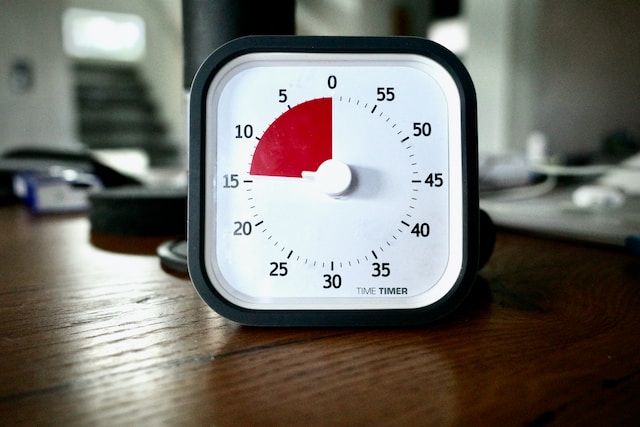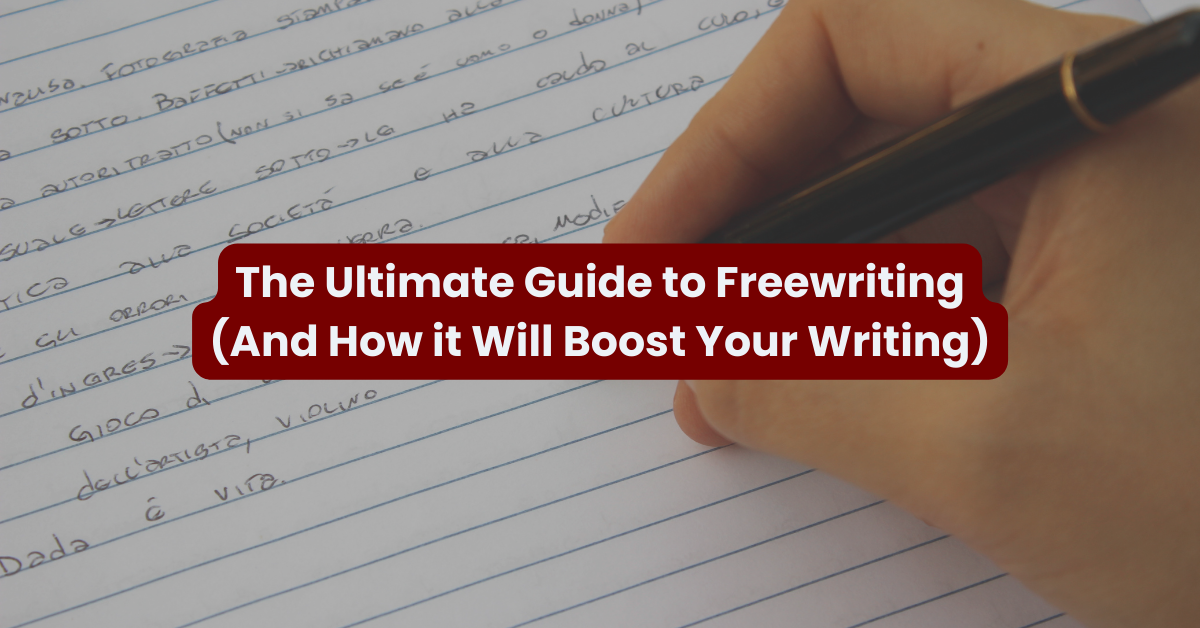The job needed someone with two years of writing experience. I had only three months, but somehow, I’d been hired.
As you can imagine, I felt like a fraud. I was inadequate and afraid.
But I was a single mom, and this was the perfect writing job for me. I’d get paid a fantastic sum of money and work from home. This meant I could still look after my son, who was just six then.
So, it was a problem that I was struggling to create good writing. And I was stressed beyond anything I’d experienced before.
I was also on probation. I was three weeks in and didn’t think the company would keep me.
Every blog post I worked on felt like a mountain I didn’t have the skills or strength to climb. And self-doubt hounded me like snarling wolves at my feet.
I was mentally blocked, drained, and working too many hours for my tasks.
And then I found the answer. The technique changed everything and not only made me survive my job probation but also thrive as a writer.
Meet FREEWRITING – the greatest and most UNDERESTIMATED technique for writers to write more and better.
What is it, and how will it transform you into a powerful writer? You’ll learn all that and more here.
Introducing the Key to Overcoming Writer’s Block
Imagine the creative, productive part of your brain as a parent.
Now, the parent is surrounded by several noisy and uncontrollable children. These kids represent your thoughts and feelings.
And the kids are going haywire; they’re screaming, yelling, laughing, running around, and asking questions non-stop.
Effective parents deal with over-excited kids by keeping them busy or tiring them out so they can get their work done.
Similarly, you can wangle your out-of-control thoughts. By doing so, your brain will bring up your most creative, useful, and insightful writing.
How? It’s through this powerful technique called ‘freewriting’
It’s how I overcame procrastination and crippling self-doubt when I first became a writer. Since then, I’ve worked as a professional content writer and blogger and have written thousands of posts serving clients in different fields.
In this post, I’ll break down what is freewriting and how to use it. No more staring at a blank screen stuck or procrastinating. This is the tool to help you become the writer you want to be.
What is Freewriting
Freewriting is writing continuously for a set time limit or for a set number of pages without pausing for any reason. It’s similar to the ‘flow of consciousness’ way of writing.
The key is to very literally never stop writing for any reason.
This means that you must not stop to think, correct mistakes, delete words, rewrite, or remove your hands from the keyboard or a pen from paper.
Also, it’s about writing anything that appears in your mind as it is. You may NOT refine, improve, or deny anything as you write.
The goal is to be as unfiltered, uninhibited, and unrestricted as possible.
But why?
The next section explains why freewriting has the rules it does.
Why Does Freewriting Work?
Returning to the parents and kids analogy, just like you want to tire kids out or make them busy, you want to wear out the thoughts that keep you from writing.
These thoughts and feelings are the ones that tell you you’re not good enough, you’re tired, you’re uninspired, or whatever is your special cocktail of self-sabotaging beliefs.
When you write quickly and don’t allow yourself to overanalyze, you’re effectively solidifying your thoughts – by appearing as words and letters on a screen or paper.
Instead of your thoughts swirling around in your brain like a never-ending storm, you work them into a paper or screen, forcing your mind to reach DEEP for more thoughts.
Your superficial, circling thoughts will diminish. And your brain will expose the deep gold mine of insights that were always there.
Here’s a quote on how freewriting works by Mark Levy, author of Accidental Genius:
Freewriting prevents [the brain from being lazy or shutting off] from happening. It pushes the brain to think longer, deeper, and more unconventionally than it normally would. By giving yourself a handful of liberating freewriting rules to follow, your mind is backed into a corner and can’t help but come up with new thoughts
~ Mark Levy
Freewriting is the BEST way to overcome writer’s block because anyone can do it from the comfort of their desk. You don’t have to go for meditation classes, you don’t need coaching, you don’t need peer pressure or to invest in tools. It’s cheap or free, and it will start giving you results right away.
How to Freewrite
Here’s what you need to start free writing:
- A journal, a sheet of paper, or a notepad
- Your favorite pen or pencil
- Your personal computer if you want to work on that
- A timer -either on your phone, as a separate device, or an app on your computer
- Some free, uninterrupted time for freewriting sessions
Step 1: Arrange Your Writing Implements
Find a comfortable place where you can type or write without getting up for any reason.


I suggest having water nearby, putting your phone on flight mode, and arranging the lighting in your room for comfort. These few steps will ensure you get the best out of your freewriting session.
Arrange your pen, paper, or computer with a text editor open and ready.
Step 2: Focus on a Topic (Optional)
With freewriting, you can write about a specific problem or topic that you are having trouble with. Or you can choose to write without any focus or goal in mind. Choose the first option if you want to produce specific content. And choose the second option if you want to explore your thoughts in general.
A topic or goal could be:
- To flesh out a specific character for your novel
- To figure out your most important values in life
- Write a beautiful wedding vow
- Make peace with an event or person you cannot forgive
- How to find the right customers for your business
As you can see, you can focus on anything or nothing at all. Feel free to literally start with the blank page.
Step 3: Set a timer


For your first attempt at freewriting, set a timer for 5-10 minutes to get the hang of it.
After a while, set a time for 20 minutes of sheer freewriting. And when you’ve had practice and experience, you can write for hours together – this is great for long-time writers who want to flesh out large books or dive deep into an idea.
When you’re ready. Turn on the timer. And write!
Step 4: Write (Never Edit or Pause)
Picture a dam opening and a rush of water flowing through. The water rushes out forcefully and overwhelms all obstructions. It never loses momentum until all its force is spent. And in the end, it becomes a steady stream, calm and peaceful.
This is how you should begin writing your initial thoughts as they flow.
NEVER edit, erase or delete a single word or phrasing.
NEVER pause or quit until the timer goes off.
NEVER stop writing.
And put down everything, whether it’s curse words, repeated sentences, absurd ideas, or your complaints against the neighbors.
You can direct your thoughts toward a topic if you like. Or write down whatever comes up.
Just keep writing until you hear the timer go off. Then stop and review your work.
Step 5: Review Your Writing
Now that your timer has gone off, you can take a break and come back to review what you’ve written.
You might be surprised at what comes out of your brain when you allow it to flow freely.
Some of it may not be great, but there will be some gems hidden in there. These could serve as the starting point for a new story, a blog post, or even just a good idea to explore further.
The entire point of reviewing your content is to observe:
- That you CAN write
- That you need to push through any blocks and self-sabotaging thoughts
- That you can find your best insights if you give it time
You’ll need to edit your writing, but you’ll have the bones of your future book, article, or poem.
Step 6: Edit Your Work
Now, it’s time to make your efforts turn into printable content.
Spend some time checking for grammar and punctuation errors. You may fix any spelling issues, change phrases, rearrange your sentence structure, or do something else.
You’ll find a lot of unusable material at this stage. However, remember that no writing is truly useless. It can serve as a stepping stone to refine your thoughts and ideas, leading to a more coherent work.
Freewriting makes the ‘first draft’ of your writing project. It’s raw, unfiltered, and filled with potential. It won’t be perfect, but you have a starting point. Your job is to refine and polish it into a final version.
During this step, don’t be surprised if your freewriting takes on other forms. For instance, what started as a random stream of thoughts might transform into an insightful blog post, a captivating short story, or even the outline of a novel.
The beauty of freewriting is its unpredictability and the potential for creativity it brings to the table.
Remember, editing is an integral part of the writing process. Don’t rush through it. Take your time to review, revise, and reshape your work until it communicates your thoughts effectively and engagingly. You can also use AI tools to edit your work, like Grammarly, WordTune, or QuillBot.
Step 7: Start the Cycle Over
After a break, you can start the whole process of freewriting again.
Maybe you could explore different viewpoints or try a different topic or idea. And increase the length of time you write.
You could also write until you fill a specific number of pages or meet a fixed word count.
Many writers also follow the Pomodoro technique when freewriting i.e. writing for 25 minutes and taking a short break before resuming.
More Tips to Make Freewriting Work
You should know:
- That it will take time for you to get used to freewriting. Eventually, you’ll find that you can create content without this technique.
- You have to trust the process and let it happen. Write the first thought that comes to your mind, then write the next, until you’re done.
- Freewriting can dig up powerful solutions for your story or even to solve a business problem. Choose a focus topic and freewrite about it.
- Work with a team or a peer group of writers. Sitting together and writing in silence is powerful and will help you focus. If your group is comfortable, all of you can share your writing and insights with the group.
Where You Can Apply Freewriting
Let’s look at use cases or applications where freewriting can benefit you:
- Completing a blog post or article when you feel stuck
- When you don’t have ideas
- Dealing with trauma. Spend half an hour or more freewriting on traumatic and difficult incidents. Freewriting is also a healing way to process trauma
- Write a speech like a best man speech, wedding vow, vote of thanks, and anything else
- Craft poems
- Come up with a business plan
- Deal with work challenges
- Understand your feelings and experience
- Journaling when you don’t know what to do or what’s bothering you.
Freewriting is a powerful tool that can help you in more ways than one. With patience, practice, and persistence, it will become an invaluable part of your writing process and self-discovery journey.
Benefits of Freewriting
So, here’s the real reason why freewriting is so good for anyone: it makes you own the writing process to achieve any goal you want.
You tap into your consciousness and find anything you need: inspiration, ideas, stories, solutions, and more.
This is the ultimate way to overcome any writing blocks you face without spending a cent, downloading an app, or going around in circles.
The benefits:
- Write faster and for longer i.e. be a more productive writer
- Carry out effective brainstorming
- Come up with more creative ideas
- Gain confidence in your writing skills
- Never get stuck with writing again
- Get rid of stress
Practice free writing daily, and you’ll see a difference in how you feel, how you think, and how much better your language becomes. Just five minutes a day is all you need.
What Tools to Use for Freewriting?
You don’t need tools and apps for freewriting. You just keep your hand moving and extract what’s in your head onto a paper or screen.
But using the right tools can enhance the benefits you get from a freewriting exercise.
Here are the best tools to use:
- Omm Writer and other distraction-free flow writing tools
- Google Docs
- WordTune
- Paper journals
- William Penn pens
I recommend working with the right tool for you. Anything that makes you start writing and makes ideas flow should be part of your writing kit.
Books on Freewriting
I suggest reading the following books to research freewriting and to uncover your skills as a writer.
- Accidental Genius by Mark Levy: This book uncovers the power of freewriting to generate innovative ideas, solve complex problems, and unlock your creative potential. Levy provides a host of tips, tricks, and techniques to make freewriting a part of your regular routine, leading to unexpected strokes of genius.
- Writing With Power: This book by Peter Elbow inspired Mark Levy to start freewriting. This is the OG source on this topic.
- The Writer’s Way by Julia Cameron: A true classic, this book offers a comprehensive approach to develop your writing skills, explore creativity, and overcome writer’s block. Its core concept is ‘Morning Pages’, a variant of the stream of consciousness writing. And it is a transformative tool for writers everywhere.
- Writing Down the Bones by Natalie Goldberg: Goldberg presents freewriting not just as a practical tool but a Zen practice, guiding writers to tune into their inner voice and write with authenticity and vigor. Her unique blend of writing wisdom and spiritual insight makes this a must-read for anyone seeking to deepen their writing craft.
Conclusion
Freewriting is a powerful tool for overcoming writer’s block, getting ideas, and exploring your thoughts.
It’s a technique that can be applied in various situations, from writing to personal growth. With practice and patience, it can become an integral part of your creative process and lead you to new and unexpected insights.
So why not give freewriting a try?







